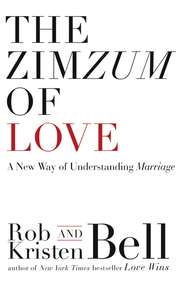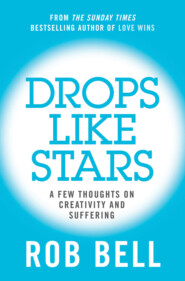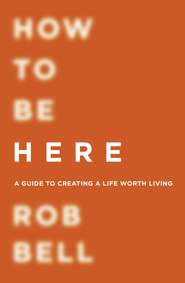По всем вопросам обращайтесь на: info@litportal.ru
(©) 2003-2024.
✖
The Complete Rob Bell: His Seven Bestselling Books, All in One Place
Автор
Год написания книги
2018
Настройки чтения
Размер шрифта
Высота строк
Поля
These are all commands that appear in the Bible. And yet they are rarely followed. This is because someone somewhere made a decision about those texts; someone decided that Christians didn’t have to greet one another with a kiss or wear head coverings or curse people who don’t love the Lord.
All of these verses have been interpreted by someone, whether it was a priest or a denomination or a pastor or a council somewhere—somebody somewhere engaged in the difficult work of binding and loosing. Somebody in your history decided certain Bible verses still apply and others don’t.
At one point in church history, a group of Christians decided that the Sabbath is not Saturday but Sunday. If you go to a mass or service or house church on Sunday, then you are, in essence, agreeing with their binding and loosing.
Now some people may get a little uneasy about this discussion on interpreting the Bible and say, “We shouldn’t make it say what we want it to say.”
I agree, but everybody is resting on a set of interpretations, and we need to be honest about it.
And not only is everybody resting on someone’s binding and loosing, but that binding and loosing was new for its day. When people stepped forward and said, “You have heard it interpreted this way, but I tell you it really means this,” it was progressive for their day. They were making new claims about what it means to be true to the Bible. What is accepted today as tradition was at one point in time a break from tradition.
This truth about interpreting the Bible extends all the way to the simple reading of it in English. If we don’t read the Bible in its original Greek or Hebrew or Aramaic, then we are reading someone’s interpretation of the Bible. Just the work of translating requires the translator to make decisions about what the Bible says. Certain Greek or Hebrew or Aramaic words do not have an exact English equivalent, leaving the translator with a challenge of how to best represent the text using English words.
Here’s an example: The word hell is found fourteen times in the Bible, twelve of those occurrences being found in the teachings of Jesus. The word hell in English is the word gehenna in Greek. Gehenna is a reference to the Valley of Hinnom, a ravine on the south side of the city of Jerusalem. This valley was the site over the years of many violent and horrible deaths, and it came to be viewed as cursed. By Jesus’s day it had become the town dump. Garbage, trash, wild animals fighting over scraps of food, a fire burning—a place of waste and destruction. Some referred to it as the place with the gnashing of teeth where the fire never dies. So when Jesus uses gehenna, it is loaded with meaning and visual power—everybody knew what he was talking about. The translator is faced with a decision about how to translate the word. If he or she uses the word hell, later readers might miss the fact that Jesus is talking about a present reality. If the word gehenna is used, readers might understand the present, geographical meaning of the word but miss the bigger implications. Every translation, every version, every paraphrase of the Bible requires thousands of decisions about how to interpret what these words are saying to us today.
Which leads to another observation: Binding and loosing demand an intricate balance of conviction and humility.
When those first Christians in Acts 15 came out of their meeting and announced their decision regarding the Gentiles, they said the strangest thing: “It seemed good to the Holy Spirit and to us not to burden you with anything beyond the following requirements.”26 (#ulink_308c4558-588b-54a6-88fd-4f2123508583)
Let me repeat that one phrase again: “It seemed good to the Holy Spirit and to us.”
They are making a monumental decision in the history of Christianity, and the best they can say is that it seems like it is the best decision? It seems good to them and the Holy Spirit?
They don’t claim to have an absolute word from God on the matter; they at best claim guidance from the Spirit of God, but they even hold that loosely.
What is so beautiful about the language in Acts 15 is that they make a decision, they step up, they take their responsibility seriously, they acknowledge a strong sense of God’s leading, but they remain humble.
With their “seems,” they leave room to admit they may not have nailed it perfectly the first time. They hold their action and God’s action in healthy tension. They understand that they have action to take, but they also understand that God is at work as well. They don’t take a passive route, which is to do nothing and assume that God will miraculously do it all. And they don’t take a route based in human arrogance, which leaves no room for the leading and guiding of the Spirit of God.
What if we were to say about what we do, “It seems good to the Holy Spirit and to us”?
I love the sense of movement in these first Christians’ language, like they are discovering things and making decisions, but there is this inherent assumption that they are on a journey. There is more ahead. And God is with them every step of the way.
They aren’t done painting.
Alive Today
Here’s another observation about binding and loosing: You can only bind and loose if you believe the Bible is alive.
Let me get at this truth with a question: Is the greatest truth about Adam and Eve and the fruit that it happened, or that it happens?27 (#ulink_cb15780f-11ca-50b3-9692-85db1917b6f0) This story, one of the first in the Bible, is true for us because it is our story. We have all taken the fruit. We have all crossed boundaries. We have all made decisions to do things our way and then looked back and said to ourselves, What was I thinking? The fruit looked so great to Adam and Eve for those brief moments, but the consequences were with them for the rest of their lives. Their story is our story. We see ourselves in them. The story is true for us because it happened and because it happens. It is an accurate description of how life is. The reason the stories in the Bible have resonated with so many people over the years is that they have seen themselves in these stories.
Here is another example: The Israelites leave the kingdom of Egypt where they are slaves, and God brings them out into freedom.
It happens.
Every day.
For many of us, that is our story. We were in darkness and God brought us out. And we continue to identify areas of darkness in our lives, and God continues to bring us out.
So the exodus is the Israelites’ story, but it is also our story. It happened then; it happens now.
In fact, in a Jewish synagogue to this day, you will probably hear kids taught the story of Exodus as their story. A friend of mine recently heard a Jewish kid say, “We were slaves in Egypt and Moses led us out, and we complained in the wilderness.”
This is why the Bible is still so powerful: These ancient stories are our stories. These stories are reflective of how things are.
And this is why the Bible loses its power for so many communities. They fall into the trap of thinking that the Bible is just about things that happened a long time ago.
But the Bible is about today.
These stories are our stories. They are alive and active and teaching us about our lives in our world, today.
The rabbis spoke of the text being like a gem with seventy faces, and each time you turn the gem, the light refracts differently, giving you a reflection you haven’t seen before. And so we turn the text again and again because we keep seeing things we missed the time before.28 (#ulink_90042454-82cb-5b74-b14e-c933d2802884)
I was talking to a pastor several years ago who was preparing a sermon, and I asked him if he was ready to give it. He said, “Oh yeah, I’ve got this passage nailed.” How is that possible?
When you embrace the text as living and active, when you enter into its story, when you keep turning the gem, you never come to the end.
I just wrote a phrase from the Bible on the wall of the room I am writing in right now. It’s from John 11 where a man named Lazarus dies. Jesus meets up with Lazarus’s sisters who are complaining that Jesus got there too late to save their brother. When Jesus tells them to roll away the stone in front of where Lazarus is buried, one of the sisters, Martha, complains that there will be a terrible odor, “for he has been there four days.”29 (#ulink_704afd2c-0fc0-540e-9b54-c5660d1d643e)
The King James Version reads like this: “He stinketh.”
For some odd reason, I have not been able to get that phrase out of my head lately. “He stinketh.” It’s working on me. It’s teaching me. I’ve been meditating and reflecting on it and turning it over and over in my head and my heart. Inspired words have a way of getting under our skin and taking on a life of their own. They work on us. We started out reading them, but they end up reading us.
This is what happens when the Bible becomes living and active. The strangest dimensions of these stories grab us and won’t let go.
And this phrase continues to swirl around in my mind and my heart. Where is there death in my life? Where am I dying because of decisions I’ve made? Where do I “stinketh”?
“He stinketh” is written on the wall of this room because it is my story.
It happened in John 11.
It happens for me every day.
The reason the Bible continues to resonate with so many people isn’t just because it happened. What gives us strength and meaning and direction is something in addition to the historical events: It is the meaning of these events. Some call this the more-than-literal truth of the Bible.30 (#ulink_895b75b5-7e3e-52a5-8ca8-7577b66dddf2)
We live in the metaphors. The story of David and Goliath continues to speak to us because we know the David part of the story—we have lived it. The tomb is empty because we have met the risen Christ—we have experienced Jesus in a way that transcends space and time. And this gives us hope. We were in darkness and God brought us out into the light.
The Word is living and active and it happens. Today.
Real, Real, Real
In order to bind and loose, we must understand that the Bible did not drop out of the sky. It was written by people. People who told stories and passed on oral traditions and sat down and wrote things with a pen and paper. The Bible originated from real people in real places at real times.
It is poems and stories and letters and accounts. It is people interacting with other people in actual space and time. It is God interacting with people in actual space and time. We cannot ignore this.
To take statements made in a letter from one person living in a real place at a moment in history writing to another person living in a real place out of their context and apply them to today without first understanding their original context sucks the life right out of them. They aren’t isolated statements that float, unattached, out in space.
They aren’t first and foremost timeless truths.











